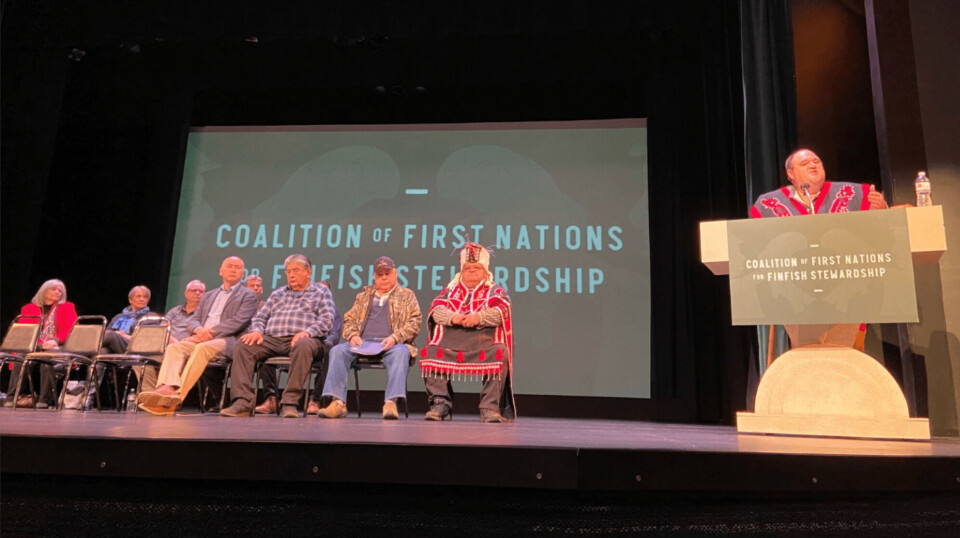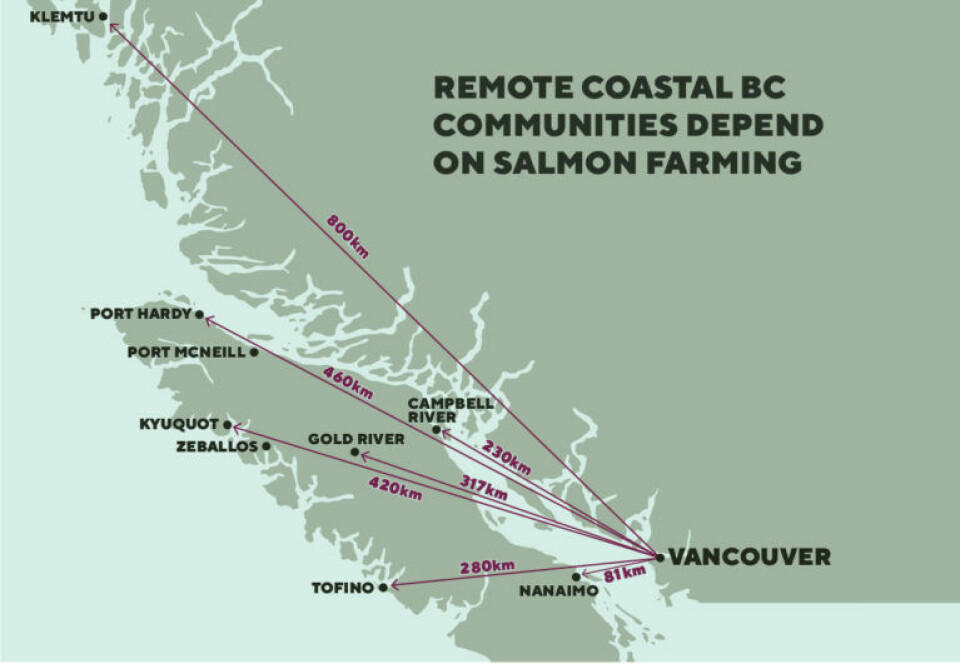
Fish farm licence renewals 'are a matter of life and death'
First Nations express fear of poverty, unemployment and suicides if Canadian government fails to support British Columbian salmon sector
Keeping in-ocean salmon farming in the traditional territories of First Nations is the difference between meaningful work and unemployment, between prosperity and poverty, and even between life and death, Canadians have been told.
The importance of the industry in those areas was spelled out in a letter published as an advertisement by the Coalition of First Nations for Finfish Stewardship in the Globe and Mail, a leading Canadian newspaper that reaches six million readers weekly in print and online.
The advert also contained a map to show urban Canadians how remote the British Columbia First Nations communities are, emphasising their reliance on salmon farming.

The Coalition published the letter as part of its campaign to persuade the federal government to renew salmon farm licences for at least six years when they expire at the end of June.
“Today we published a letter to Canadians in the Globe & Mail discussing the importance of salmon farming to our remote coastal communities, and asking them to support our rights, our self-determination and our economies in this matter,” the Coalition said in a Facebook post yesterday.
“Ottawa is close to making a decision on salmon farm licence re-issuance, and we need a minimum of 6 years for business certainty in our territories.”
The Coalition added: “We are already receiving positive emails from people across the country. Thank you for your support on this critical matter.”
Prosperity or poverty
In the letter, which can be read here, the Coalition explains that while the issue of salmon farming’s future in BC “might be trivial, if not completely unknown, to most Canadians, for our remote coastal communities keeping in-ocean salmon farming in our territories is the difference between meaningful work and unemployment, between prosperity and poverty, and even between life and death”.
It adds: “The effect this sector has on the social health and economies of our communities cannot be emphasised enough. Salmon farming supports over 500 direct and indirect jobs for local First Nations (thousands for non-Indigenous) and injects over $50 million a year into our communities. For most First Nations working with salmon farming, 50-60% of our economic revenue stems from salmon farming and our Indigenous businesses that support the sector.
Our culture revolves around family and community. Having our people, especially our young people, have meaningful work in our remote communities is priceless to them and their families
Coalition letter to Canadians
“We are not near big urban centres. We live in rural parts of the coast, some of which are only accessible by boat, float plane, or logging roads. If one of our people loses a job in our small towns, villages, or reserves, they will unlikely find another to replace it without leaving our community. Meanwhile, our culture revolves around family and community. Having our people, especially our young people, have meaningful work in our remote communities is priceless to them and their families.”
Misleading information
The letter also takes aim at the industry’s opponents who claim that salmon farming is a threat to wild Pacific salmon stocks, despite at least 10 studies by government scientists which conclude that is not the case.
“Wealthy, urban activist groups in Vancouver spend hundreds of thousands of dollars to bombard your social media with misleading information about salmon farming,” writes the Coalition. “Rather than spending that money on wild Pacific salmon revitalisation projects or habitat restoration, they flood your phones with emotive images and oversimplified statements with the intent to sway government decision-makers and ultimately harm our communities and our rights as Indigenous peoples.
Today 100% of farmed salmon is raised in partnership with BC First Nations. We believe this is a first for any industry in the province
Coalition letter to Canadians
“Despite what activists say, the sector has come a long way in the past decade regarding technology, practices, transparency, community support, wild salmon enhancement, and Indigenous relationships. Today 100% of farmed salmon is raised in partnership with BC First Nations. We believe this is a first for any industry in the province.”
Dark times
Nations like the Kitasoo Xai’xais, Tlowitsis and Gwa’sala-’Nakwaxda’xw have balanced conservation, revitalising wild salmon, and finding economic opportunities from their resources, the letter to Canadians states. The Kitasoo Xai’xais have protected 52% of their territory and also successfully farm Atlantic salmon with their smoked salmon product, Klemtu Spirit, now sold in grocery stores across Canada.
“For a community of 420 people located 800 km (500 miles) north of Vancouver only accessible by boat or float plane, the Kitasoo Xai’xais’ story is one of resilience and resurgence from the dark times before they engaged in salmon farming. Their Nation went from 5% employment in the Nineties to 99% employment today. They have not had a suicide in 18 years.”
True reconciliation
The Coalition concludes: “Canada, we need your support more than ever – your support for our rights, our self-determination, our food security, and salmon in our waters – wild and farmed. Trust that our Nations know how to manage our territories. This is an incredible opportunity to show the world what true reconciliation with Indigenous peoples looks like. So, let’s show them.
“Please join us in asking the Government of Canada to protect our communities and re-issue the licences of salmon farms in our territories for a minimum of six years. We thank you for your support.”

























































